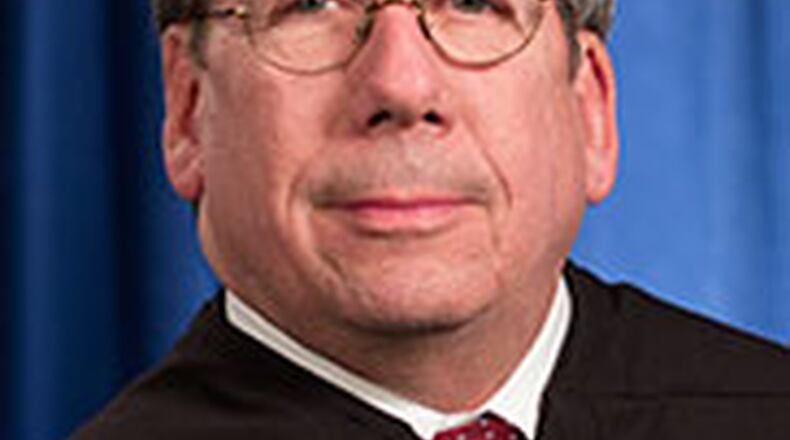RELATED: Ohio Supreme Court Justice comes to defense of 'all heterosexual males
Ohio Auditor Dave Yost, a Republican, again called for O'Neill to step down, saying that he is clearly a partisan candidate and the Ohio Code of Judicial Conduct requires a resignation.
“The only remedy in the rule is resignation,” said Yost, who is running for Ohio Attorney General. “He’s made a tacit admission that he is a candidate by saying that he is going to recuse himself on everything (new).”
“The translation: ‘I’m going to stop doing most of my work but I’m still going to keep my pay.’ That’s not fair to the taxpayer,” Yost said.
RELATED: William O’Neill urges Democrats to leave party
Rule 4.5 of the code governing judges states that, “Upon becoming a candidate in a primary or general election for a nonjudicial elective office, a judge shall resign from judicial office.”
The comments section of the code also elaborates on the issues raised when a judge makes partisan remarks or promises during a campaign.
Such remarks are “inconsistent with the role of a judge, who must remain fair and impartial to all who come before him or her,” according to Rule 4.5 comments. “The potential for misuse of the judicial office, and the political promises that the judge would be compelled to make in the course of campaigning for nonjudicial elective office, together dictate that a judge who wishes to run for such an office must resign upon becoming a candidate.”
In a statement released by his campaign spokesman, O’Neill said, “I agree with that rule. And I will become a candidate pursuant to (Ohio Revised Code) 3501.01 when I am certified for the ballot in February of 2018. I will step down at that time. To do so any earlier is unfair to the two million Ohioans who elected me.”
A candidate for governor can only be certified after obtaining 1,000 valid signatures of registered voters on a petition that the candidate must sign declaring his or her candidacy for nomination. Those petitions are already being circulated by some statewide candidates, including Yost, who said the petitions need to be passed well in advance of the Feb. 7 filing deadline since a rule of thumb is to get at least 3,000 signatures to wind up with enough valid ones.
“I think that lawyers tend to be too clever by half, and this idea that you don’t become a candidate before you actually make a formal filing is so much hooey,” Yost said.
If O’Neill did resign, Ohio Governor John Kasich, a Republican, would appoint his successor.
Rarely used process
Any citizen could file a complaint alleging a violation of the judicial code. A special and rarely-used process involving the Ohio Court of Appeals Judges Association governs complaints made against supreme court candidates and sitting justices, said Richard A. Dove, director of the high court-appointed Ohio Board of Professional Conduct.
Ironically, the last case handled in the process involved O’Neill. A complaint was filed against him when, as a candidate for the state supreme court in 2012, he circulated campaign literature referring to himself as “Judge O’Neill” even though he was a retired Ohio appellate judge. The literature also identified him as a retired judge.
In March 2012, a five-judge hearing panel ruled against O’Neill and ordered that he cease and desist calling himself a judge. However, the ruling was later overturned, according to court documents.
Ohio Supreme Court races are officially non-partisan, although in practice the political parties nominate General Election candidates in their primaries.
Chief Justice Maureen O’Connor has said that O’Neill’s decision to run for a partisan office raised “considerations that are governed by the Rules for the Governance of the Judiciary and the Code of Judicial Conduct.”
“I encourage Justice O’Neill to consider his future course of conduct in light of his oath of judicial office and the ethical obligations imposed upon all judges of this state,” she said after he announced his candidacy on Oct. 29.
O’Connor, had no further comment Friday. As a result of his recusal from new cases, O’Connor will appoint judges from the court of appeals to sit in his place, according to a news release issued by the court Friday.
Pepper: ‘We just started the vetting’
Ohio Democratic Party Chairman David Pepper said the party will vet O’Neill, as it does with all candidates for statewide office.
“We just started the vetting process and the first question we will be asking is how does the rule apply to his situation,” Pepper said.
The other Democrats running for governor are Dayton Mayor Nan Whaley, former state Rep. Connie Pillich of Cincinnati, state Sen. Joe Schiavoni of Boardman, and former U.S. Rep. Betty Sutton of Akron.
O’Neill on Thursday sent his notice of recusal to the Ohio Supreme Court Clerk Sandra H. Grosko, saying he wanted to avoid the “appearance of impropriety” as he runs in the 2018 race for governor.
“I will not be participating in any new matters submitted to the Court from this date forward until February 7, 2018. I will continue to vote on and participate in the resolution of the approximately 99 cases which have been submitted and not yet released,” O’Neill wrote.
He plans to resume full participation on the court if he terminates his campaign.
O’Neill took office in January 2013 and is the lone Democrat on the state’s high court. His term ends Jan. 1, 2019, and because he is 70 cannot run for re-election due to age limits.
Other stories by Lynn Hulsey
Jon Husted: Replacing Ohio’s voting machines will be costly
RTA to buy 26 electric trolley buses — at $1.2 million each
Officials tout new bestiality law but say cases are tough to prove
Groups like the KKK preach white power but shun ‘hate’ label
About the Author

